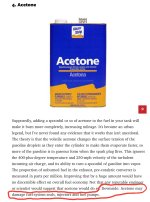Having been around airplanes for the first half of my life, and working at the airport FBO for 6, I know why they still use leaded gas for most piston aircraft. It's a necessity. If your lawn mower dies, you can just pull over and park. Airplane, not so much.
As for land based equipment, there's no need to use leaded fuel. Lead is the leading cause of spark plug fouling. Thinking about how many times I've sat in a small aircraft during pre flight run ups and switching the mags back and forth and running the engine up to try figure out which side had the fouled plugs and un-fouled plugs, and having to taxi back in because they're still fouled.... thinking about cars pre-unleaded gas, and how many times I've had to change the plugs VS since unleaded, the plugs tend to outlast the body parts.
If people would just take care of their equipment, follow the manufacturer's recommendations on maintenance and fuel, etc.... they'd not have problems. Most problems are operator induced.
Sure, if you're not going to use a small engine for months and months, you might want to shut off the fuel supply and run the carb out of gas. You might want to use fuel stabilizer. Either one of those options is a heck of a lot better for the environment and your wallet than 100LL needlessly spewing lead into the environment. Add to that, the price of 100LL is averaging about $4.70 a gallon today (
100LL - Aviation Fuel Prices ) while regular gas is about $2.16. That's more than double the price.
There's a reason leaded fuel was banned for ground use. It's poison. Here's a list of the countries that still allow use of leaded gasoline for ground use:
Algeria, Iraq, Yemen, Myanmar, North Korea, and Afghanistan
That right there should tell you something about leaded fuel.

